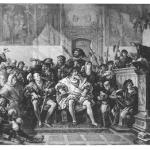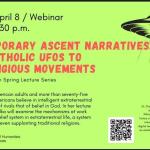Rome, Italy, Mar 24, 2016 / 11:50 am (CNA/EWTN News).- During a Mass in Rome on Holy Thursday Pope Francis washed the feet of migrants and refugees, many of whom were moved to tears by the gesture. The Pope told them that while there are some people in the world who seek to sow violence, Jesus shows us the path to unity, brotherhood and peace. “Today, right now, when I do the same gesture as Jesus in washing the feet of you 12, all of us are making the same gesture of brotherhood,” he said March 24. “We are different, we are unique. We have different cultures and religions, but we are brothers and we want to live in peace,” he said, adding that “each of you has your own story. Many crosses, many pains, but also an open heart that wants brotherhood.” Francis spoke to the 900 migrants and refugees currently housed at the Reception Center for Asylum Seekers, or CARA, in Castelnuovo di Porto, just over 18 miles outside of Rome. Nearly all of them come from sub-Saharan Africa. The Pope decided to celebrate his Holy Thursday Mass of the Lord’s Supper at the center, after spending previous years offering the Mass in prisons and a rehab center for the disabled. Nearly 900 migrants and more than 100 volunteers will attend the Mass. Most of the migrants hosted at CARA are Muslims, and among the Christians, most are Copts or Protestants. During the Mass, Pope Francis washed the feet of 11 migrants and of one volunteer. Of the migrants, four were Catholic youths from Nigeria, three were Coptic women from Eritrea, three were Muslims, and one was a Hindu youth from India. While tears could be seen in the eyes of several of the men and women whose feet the Pope washed, one woman was particularly moved. She had been tearful while the Pope washed her feet, but began to sob as Francis reached up to touch her baby. In his homily, the Pope stressed that “actions speak more than images and words,” and pointed to the day’s Gospel reading from John in which Jesus washes his disciples’ feet before being betrayed by Judas, who turned him in for 30 pieces of silver. Francis pointed to two separate gestures in the passage, the first was being “Jesus, who serves, who washes the feet. He, who was the head, washes the feet of his, the smallest.” The second gesture was that of Judas, “who goes to the enemies of Jesus, those who don't want peace with Jesus, to take money…two gestures.” Pope Francis noted that the two gestures are also present today. One, he said, seeing everyone from different cultures and religions gathered together. “Muslims, Hindus, Catholics, Copts, Evangelicals, but brothers. Children of the same God who want to live in peace, integrated.” However, the Pope observed that there is also the gesture of war and destruction, and pointed to the March 22 terror attacks in Belgium. The attack is an example of “people who don't want to live in peace,” he said, but noted behind that act, “just as behind Judas, there were others.” “Behind Judas there were those who gave him money so that Jesus would be delivered. Behind that act (in Brussels), there are manufacturers, arms traffickers who want blood, not peace, who want war, not brotherhood.” Francis again contrasted the actions of Jesus who washes feet, and Judas who sells his friend for money. He told the migrants despite their differences, they are all “children of the same Father, brothers.” He encouraged each of them, “in their own religious language,” to pray to God “so that this brotherhood infects the world. So that there will not be the 30 coins to kill our brother, because there will always be brotherhood and goodness. So be it.” Please see below for the full text of the Pope’s homily: Actions speak more than images and words. Actions. In the Word of God we have read, there are two gestures. Jesus, who serves, who washes the feet. He, who was the head, washes the feet of his, the smallest. One gesture. The second gesture: Judas, who goes to the enemies of Jesus, those who don't want peace with Jesus, to take money, that ... of 30 coins. Two gestures. Also here today there are two gestures. This, all of us together. Muslims, Hindus, Catholics, Copts, Evangelicals, but brothers. Children of the same God who want to live in peace, integrated. One gesture. Three days ago there was a gesture of war, of destruction in a European city. People who don't want to live in peace. But behind that act, just as behind Judas, there were others. Behind Judas there were those who gave him money so that Jesus would be delivered. Behind that act (in Brussels), there are manufacturers, arms traffickers who want blood, not peace, who want war, not brotherhood. Two gestures. Jesus washes the feet, and Judas sells Jesus for money. You, us, everyone together, different religions, different cultures, but children of the same Father, brothers. And over there (are the) poor ones who buy arms to destroy brotherhood. Today, right now, when I do the same gesture as Jesus in washing the feet of you 12, all of us are doing the same gesture of brotherhood, and we all say, we are different, we are unique. We have different cultures and religions, but we are brothers and we want to live in peace. And this is the gesture that I do with you. Each of you has your own story. Many crosses, many pains, but also an open heart that wants brotherhood. Each one, in their own religious language, prays to the Lord, so that this brotherhood infects the world. So that there will not be the 30 coins to kill our brother, because there will always be brotherhood and goodness. So be it. Read more




















